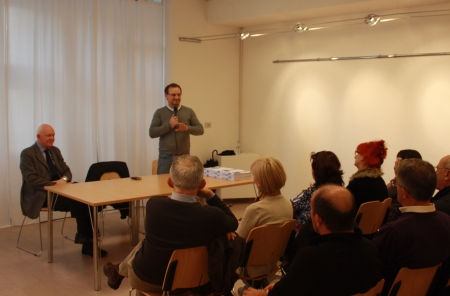
A group of Scandiano (Reggio Emilia) visited Trieste
Within the "More than Neighbours" Grundtvig project a group of 50 people from Scandiano (Reggio Emilia, Italy) visited Trieste in order to familiarize with Slovenia and the Slovenian national community living in Italy. The primary objective of this project is discovering neighbouring countries and peoples and project activities are aimed at promoting growth in line with the spirit of the common European identity, starting with the analysis and comparison of historical and cultural roots of partner countries. Project partners are Chemnitz (Germany), La Coruña (Spain), Ghent (Belgium), Liberec (Czech Republic), Lublin (Poland) and Celje (Slovenia).
At the Narodni dom premises the group of students and adults was welcomed by SKGZ s Secretary Marino Maršič, who explained them the importance and history of the Narodni dom, of the Slovenian minority in Italy and of the Slovenian Cultural and Economic Association and its extensive activities in the fields of economics, culture, sport, politics and social commitment. The Secretary underlined SKGZ s efforts to establish and collaborate with different communities, among which he mentioned the Italian minority living in Slovenia and Croatia. The guests received a copy of the organization s brochure Growing together .
The guests from the Emilia-Romagna Region were then addressed by two distinguished guests, i.e. sociologist and socio-political activist dr. Boris Muževič and Lodovico Nevio Puntin, Secretary of AICCRE (Italian Association for the Council of Europe’s municipalities and provinces) in the Friuli Venezia Giulia Region.
Muževič, a former president of the Students Union of Slovenia, member of the Socialist Alliance of the Working People of Slovenia (SZDL) and of the Central Committee of the Yugoslav League of Communists, described the situation in former Yugoslavia, which led to its dissolution and the establishment of new states. He briefly analysed the complexity of the socialist self-management system and the monopoly of one party, which gradually led to an increase in dissatisfaction of both developed and less developed parts of the country. Slovenian civil movements required a complete renewal of the Yugoslav political life, and Slovenia was the first country to change its constitution and to become independent in December 1990. This also opened the way to its membership in the European Union and NATO.
Lodovico Nevio Puntin, a former mayor of Aquileia (Italy) between 1975-1995, described the political aspects of Slovenia’s independence process and its complex path towards 30th April 2004, when it celebrated its entry into the European Union. Puntin recalled the difficult process of Slovenia s adhesion to the European Union and as an example mentioned the 10th October 1994, when the signing of an agreement between Italy and Slovenia failed in Aquileia. With this document Italy promised to support an early entry of Slovenia into the EU, but a part of the Italian majority required more compensatory measures and re-opened the issue of the abandoned properties in Istria.
AICCRE s Regional Secretary underlined some significant achievements, there were the result of cooperation between European countries, such as the constitution of ECSC (European Union Coal and Steel Community) in 1952 and the European Community itself. He mentioned some important political actors, such as the French Foreign Minister Robert Schuman, Italian statesman Alcide de Gasperi and German statesman Konrad Adenauer. With the Treaty of Rome it was possible to maintain peace in Europe and encourage collaboration between local communities, who are still committed to reconciliation, friendship among peoples and economic and social development. In overcoming historical barriers, an important role was and still is played by linguistic minorities (such as the Slovenian in the Friuli-Venezia Giulia region), who, by carrying out specific projects, are committed to economic, social and cultural development in line with the spirit of European integration.
<> Within the "More than Neighbours" Grundtvig project a group of 50 people from Scandiano (Reggio Emilia, Italy) visited Trieste in order to familiarize with Slovenia and the Slovenian national community living in Italy. The primary objective of this project is discovering neighbouring countries and peoples and project activities are aimed at promoting growth in line with the spirit of the common European identity, starting with the analysis and comparison of historical and cultural roots of partner countries. Project partners are Chemnitz (Germany), La Coruña (Spain), Ghent (Belgium), Liberec (Czech Republic), Lublin (Poland) and Celje (Slovenia).
At the Narodni dom premises the group of students and adults was welcomed by SKGZ s Secretary Marino Maršič, who explained them the importance and history of the Narodni dom, of the Slovenian minority in Italy and of the Slovenian Cultural and Economic Association and its extensive activities in the fields of economics, culture, sport, politics and social commitment. The Secretary underlined SKGZ s efforts to establish and collaborate with different communities, among which he mentioned the Italian minority living in Slovenia and Croatia. The guests received a copy of the organization s brochure Growing together .
The guests from the Emilia-Romagna Region were then addressed by two distinguished guests, i.e. sociologist and socio-political activist dr. Boris Muževič and Lodovico Nevio Puntin, Secretary of AICCRE (Italian Association for the Council of Europe’s municipalities and provinces) in the Friuli Venezia Giulia Region.
Muževič, a former president of the Students Union of Slovenia, member of the Socialist Alliance of the Working People of Slovenia (SZDL) and of the Central Committee of the Yugoslav League of Communists, described the situation in former Yugoslavia, which led to its dissolution and the establishment of new states. He briefly analysed the complexity of the socialist self-management system and the monopoly of one party, which gradually led to an increase in dissatisfaction of both developed and less developed parts of the country. Slovenian civil movements required a complete renewal of the Yugoslav political life, and Slovenia was the first country to change its constitution and to become independent in December 1990. This also opened the way to its membership in the European Union and NATO.
Lodovico Nevio Puntin, a former mayor of Aquileia (Italy) between 1975-1995, described the political aspects of Slovenia’s independence process and its complex path towards 30th April 2004, when it celebrated its entry into the European Union. Puntin recalled the difficult process of Slovenia s adhesion to the European Union and as an example mentioned the 10th October 1994, when the signing of an agreement between Italy and Slovenia failed in Aquileia. With this document Italy promised to support an early entry of Slovenia into the EU, but a part of the Italian majority required more compensatory measures and re-opened the issue of the abandoned properties in Istria.
AICCRE s Regional Secretary underlined some significant achievements, there were the result of cooperation between European countries, such as the constitution of ECSC (European Union Coal and Steel Community) in 1952 and the European Community itself. He mentioned some important political actors, such as the French Foreign Minister Robert Schuman, Italian statesman Alcide de Gasperi and German statesman Konrad Adenauer. With the Treaty of Rome it was possible to maintain peace in Europe and encourage collaboration between local communities, who are still committed to reconciliation, friendship among peoples and economic and social development. In overcoming historical barriers, an important role was and still is played by linguistic minorities (such as the Slovenian in the Friuli-Venezia Giulia region), who, by carrying out specific projects, are committed to economic, social and cultural development in line with the spirit of European integration.

